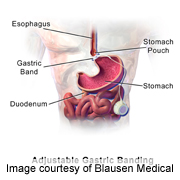- Big Health Care Disparities Persist Across the U.S., New Report Finds
- Teens Often Bullied Online About Their Weight: Study
- Work That Challenges Your Brain Helps You Stay Sharp With Age
- Urine Test Might Spot Head-and-Neck Cancers Early
- Many Seniors Are Overmedicated, But ChatGPT Might Prevent That
- Antipsychotics May Do Great Harm to People With Dementia: Report
- Two-Drug Combo Curbs Drinking for People Battling Severe Alcoholism
- Most Homeless Americans Are Battling Mental Illness
- FDA Recalls Heart Failure Devices Linked to Injuries and Deaths
- COVID Does Not Spur Asthma in Kids, Study Finds
‘Gastric Banding’ Patients Often Have Dietary Issues, Study Finds


People who’ve had weight-loss surgery need to closely monitor their nutritional intake and may require dietary supplements, according to the results of a small, new study.
Researchers looked at 23 patients who underwent gastric banding, a type of weight-loss procedure in which an adjustable band is placed around the top of the stomach to create a small stomach pouch.
Despite receiving nutritional counseling for three months after the procedure, many of the patients had nutritional deficiencies. At least 86 percent did not get the recommended daily amounts of vitamin D and calcium, a large number didn’t get enough protein, and many were slightly anemic, the investigators found.
“Our study clearly shows that there are issues regarding nutritional intake in gastric banding patients. They may need not only supplementation, but also counseling and constant evaluation,” study senior author Dr. Abhimanyu Garg, chief of the division of nutrition and metabolic diseases at University of Texas Southwestern Medical Center, said in a center news release.
The results were published recently in the Journal of Investigative Medicine.
“Bariatric [weight-loss] surgery and the lifestyle changes necessary for continued success are serious lifelong commitments,” Dr. Michael Lee, director of metabolic and bariatric surgery at UT Southwestern, said in the news release.
“Dr. Garg’s study reinforces the importance of careful patient selection and education in choosing banding, sleeve, or bypass in addition to continued follow-up,” Lee added.
Each year in the United States, 150,000 to 160,000 people undergo weight-loss procedures, according to the American Society for Metabolic and Bariatric Surgery.
Garg outlined a number of ways for people to keep their bodies healthy after weight-loss surgery. Eating more protein-rich foods will help meet protein requirements and also boost intake of vitamins and minerals, and eating fatty fish will provide omega-3 fatty acids, he said.
Patients also need to eat more fruits and vegetables, whole grains and nuts to ensure sufficient intake of dietary fiber, and should replace saturated and trans fats with vegetable oils such as canola and olive oil to increase intake of monounsaturated fat, Garg added.
It also a good idea to cut back on processed foods in order to lower sodium intake, he said.
More information
The U.S. National Library of Medicine has more about weight-loss surgery.
Source: HealthDay
Copyright © 2024 HealthDay. All rights reserved.










